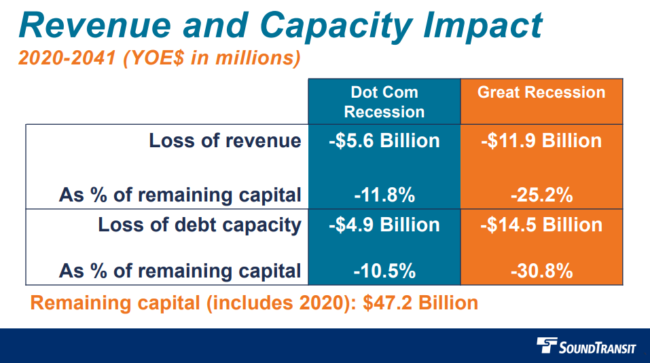Sound Transit Board sharpens pencils for ST3 program savings
 Every element of the previously expected $98 billion funding through 2041 will be under pressure in a severe recession. These estimates are from last Fall (slide: Sound Transit)
Every element of the previously expected $98 billion funding through 2041 will be under pressure in a severe recession. These estimates are from last Fall (slide: Sound Transit)Yesterday's Sound Transit Board meeting saw first steps toward the realignment of ST3 projects that now appears inevitable. In a preview of discussions to come, the meeting featured unusually intense questioning of spending on Sounder fleet procurement and parking garages in Auburn, though both moved forward.
Chairman Keel set the tone:
No project and no region is more important than any other. We are a regional board looking out for regional mobility.
Noting there would be no money for nice-to-haves', he continued:
The more we spend on any one project, the later we will deliver on other projects that have been promised to voters.
Expect to hear familiar arguments about regional vs local priorities in the next few months, particularly if the impact of the recession affects subareas differently.
There's a vast uncertainty about the trajectory of the economy over the next several years. The sharpness and suddenness of the recession is unprecedented, but it's much less clear how persistent it will be, how it will shape future revenues or costs, and how it will affect transit demand. CEO Peter Rogoff noted that a normal recession causes agencies to lose some choice riders, but also increases the ranks of the transit-dependent.
The falloff in sales tax revenue is an obvious consequence of the COVID shutdown, with retail sales down 8.7% in March and presumably by more in April. Less obviously, MVET revenue will take a hit as it's so heavily dependent on new cars and sales are down.
Without a firmer handle on the scale of revenue shortfalls, it's premature to estimate the delays to projects. Sound Transit will need to watch for both revenue shortfalls and reduced debt capacity. The debt capacity is reduced because allowable debt is a function of the assessed property values in the RTA, which are expected to be lower. The combined effect could range into the low tens of billions in a recession that is deep and sustained.
 Effects on the current capital program of recessions similar to 2000 or 2008 (slide: Sound Transit)
Effects on the current capital program of recessions similar to 2000 or 2008 (slide: Sound Transit)Rogoff reiterated that the first priority would be to continue projects already in construction or entering construction. This means keeping construction going, as much as COVID safety considerations allow, on Northgate, East Link, Lynnwood, Federal Way, Downtown Redmond, Hilltop Tacoma Link, and OMF East.
Notably, that list does not include the Eastside BRT projects where WSDOT construction is underway south of Bellevue, but Sound Transit construction mostly is not. Those will be in the mix of projects to be considered for savings.
Beyond continuing near-term rail projects, the CEO's approach is to maintain the Board's flexibility and readiness. That means work goes on for planning and final design of projects that are far enough advanced. This maintains readiness for a range of revenue scenarios. At the same time, further projects should not be moved into final design or construction so as to avoid over-commitment.
The 2010 realignment did not result in firm decisions to cancel any projects. But several projects were suspended indefinitely, and some of those only got back on track with fresh funding after the passage of ST3 in 2016.
Much of the Board discussion so far has been off-camera in subarea meetings, and further details of the cuts being considered were scarce.
With respect to the West Seattle bridge, Rogoff referenced ongoing discussions with SDOT about a possible shared bridge. Highlighting the uncertainty about whether the existing high bridge can be repaired, he also cautioned against undue optimism about a shared bridge. It would be easy, he quipped, to design a combined bridge that would be more expensive than the projects moving forward separately. Further complicating the calculus is a potential delay in rail to West Seattle. Any shared bridge requires a great deal more analysis to confirm whether it saves any money.
Sound Transit hiring is mostly frozen. The staffing was projected to grow from the current 1,000 to about 1,400 to support ST3 growth. With a slower pace of expansion, that staff growth is now unlikely, and total staffing may not grow at all.
Two projects did move forward yesterday over scattered objections. Seattle Mayor Jenny Durkan questioned a budget amendment to purchase additional Sounder South rail cars which will be used to expand service to eight car trains. That amendment was approved by the Board after discussion because it would be more expensive to procure the cars later. Sound Transit's pricing was favorable because the procurement avoided a manufacturing line being shut and restarted, and also because it is part of a multi-agency deal.
WSDOT CEO Roger Millar objected to moving forward with a parking expansion in Auburn. Pointing to the extraordinary cost - the Auburn garage is projected at $216 thousand per added stall - he argued that affordable housing units could be subsidized at similar prices. South King representatives were insistent on pointing to the promises made to add this parking. Pete von Reichbauer, for instance, said I don't want to subsidize a faucet, I want to subsidize what was planned and promised". Yesterday's board action approved the project selection, but it may yet be reconsidered when the budget needs to be approved and South King's board members must weigh it against other outlays in their area.